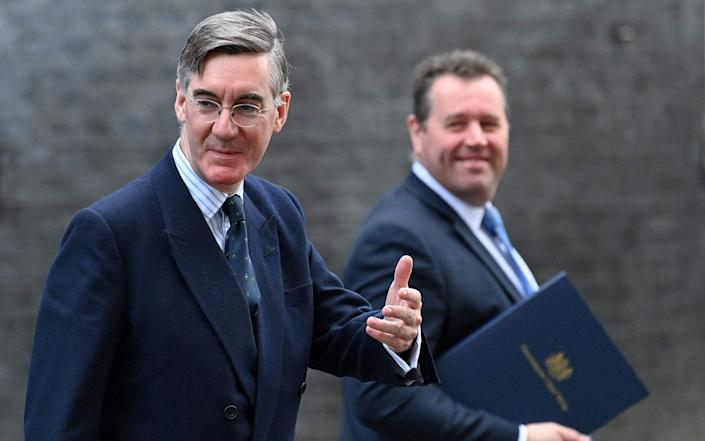
Boris Johnson has removed his chief whip and given Jacob Rees-Mogg a new Brexit reform role as he seeks to improve relations with Tory MPs.
Mr Rees-Mogg, the MP for North East Somerset – an ardent Brexiteer and loyal supporter of the Prime Minister – is expected to oversee an attempt to cut back EU-era red tape across Whitehall.
His newly-created Cabinet position puts him in charge of “Brexit opportunities and government efficiency”, meaning he could also be involved in driving through civil service reform.
Mark Spencer, who had overseen a series of party management missteps and a leadership rebellion while leading the whips’ office, replaces Mr Rees-Mogg as the House of Commons Leader.
The other most notable appointment was Chris Heaton-Harris becoming chief whip, in charge of keeping party discipline, with his immediate priority to be defeating attempts to oust Mr Johnson.
A one-time chief whip for the Tories in the European Parliament, Mr Heaton-Harris has been a central part of the so-called “shadow whipping operation” which emerged in recent weeks to lobby Tory MPs to shore up the Prime Minister.


Mr Heaton-Harris was joined in the whips’ office by Christopher Pincher, a former housing minister who has been a key part of the recent operation to protect Mr Johnson.
On Tuesday night, there was confusion about why the appointment of Mr Pincher – who had been in the running for the chief whip job – as deputy chief whip took so long to announce. He was seen entering Downing Street shortly after 1pm but his new role was not announced until almost 7pm, much later than other appointments.
The position means Mr Pincher is not a Cabinet minister, despite his recent weeks supporting the Prime Minister. He also returns to a position he held in 2018-19.
The small reshuffle was driven by political defensiveness – a need for Mr Johnson to placate Tory backbenchers demanding change in his operation after the “partygate” saga.
Already in the past week, Mr Johnson has seen the departure of four of his most senior Downing Street advisers and appointed a new chief of staff and director of communications.
Mr Spencer played a central role in the decisions to whip Conservative MPs to protect Owen Paterson over a lobbying scandal – a move that backfired spectacularly by triggering new “sleaze” claims.
Mr Paterson resigned and his long-held North Shropshire constituency then fell to the Liberal Democrats in a damaging by-election defeat.
On Mr Spencer’s watch, the parliamentary party entered a period of open revolt, with some Tory MPs submitting no-confidence letters in Mr Johnson and calling for his resignation.
He also found himself at the heart of a row about whipping tactics when Tory MPs claimed warnings they had received amounted to “blackmail”, a claim rejected by those allegedly involved.
Mr Spencer has said he is the MP whom Nus Ghani, a fellow Tory, claimed mentioned her “Muslimness” when she was sacked in a reshuffle. He categorically denied the allegation, which is being investigated by the Cabinet Office.
Jacob Rees-Mogg role includes government efficiency
Mr Rees-Mogg was also involved in the defence of Mr Paterson, which came last November and has been cited as the start of a series of blunders that led to the current political crisis facing Mr Johnson.
He faced a backlash by some colleagues after calling Douglas Ross, the Scottish Conservative leader who has called for Mr Johnson to resign, a “lightweight” figure during a TV interview.
However, neither Mr Spencer or Mr Rees-Mogg have lost their Cabinet jobs, moving sideways instead. As Commons Leader, Mr Spencer will take charge of the timing of legislation.
Mr Rees-Mogg’s new role is a full Cabinet position rather than just a post “attending” Cabinet. It includes “government efficiency” and will see him work from the Cabinet Office, meaning he will take on some of the former responsibilities of Mr Johnson’s new chief of staff.
Other responsibilities previously under Steve Barclay, who remains the Chancellor of the Duchy of Lancaster while heading up Mr Johnson’s office, were given to different government ministers.
Michael Ellis, the Paymaster General, has become a minister for the Cabinet Office and will attend full Cabinet. Heather Wheeler, a whip, has become parliamentary secretary in the same department.


Mr Rees-Mogg’s appointment could have the biggest impact on policy, driving through Mr Johnson’s promise to use “Brexit powers” to rip up EU-era rules and regulations. He will not head up diplomacy with Europe as James Cleverly was appointed Europe minister in the Foreign Office on Tuesday.
The Prime Minister’s apparent decision not to move senior Cabinet ministers underlines the limited ambition of the reshuffle, which seemed aimed at pleasing Tory backbenchers.
Angela Rayner, the Labour deputy leader, took a swipe at the fact that the Cabinet reshuffle only involved men, tweeting: “Who said dull men don’t fail upwards?”
The operation saw dozens of Tory MPs contacted, many given one-on-one meetings with the Prime Minister in a sign of how serious the political threat to him was judged to be.
Stuart Andrew, the former deputy chief whip, was announced as the new housing minister.
Mr Johnson also announced on Tuesday night that he is doubling the number of parliamentary private secretaries he has from two to four in a bid to boost engagement with Tory backbenchers. Sarah Dines keeps the role while Lia Nici, Joy Morrissey and James Duddridge were also appointed.
Three of the four Tory MPs are from the 2019 election intake – the group which included rebels trying to oust Mr Johnson who were described as the “pork pie plotters”.




